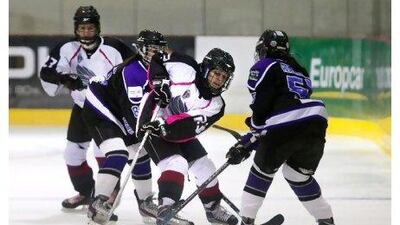ABU DHABI // Ice hockey in the Emirates has been on an upwards trend since the UAE team's triumph in the Challenge Cup of Asia, which they hosted in 2009.
Following that success, the Abu Dhabi Ice Sports Club (ADISC) was established to oversee the overall development of the sport in the country.
And working on the recommendations of the International Ice Hockey Federation (IIHF), it founded the Emirates Hockey League (EHL), which is in its third year, and introduced an Under 20 league that gets underway from Saturday. It also started various age-group competitions in Under nines, 12s, 16s and 18s.
Last week, they broke new ice with the first official women's game between the Dubai Cameluscious and the Abu Dhabi Storms, a team in which the majority of the players are Emiratis, at the Abu Dhabi Ice Rink.
There are more than 50 players in the Storms squad, and the number is growing with several young prospects waiting for their turn to be enrolled, according to Alia Al Alawi, the Storms's goalkeeper. "The game was introduced to us last year, and it took off like a storm, literally," said the 16 year old.
"Almost all of the Emirati players in the team were skating for recreation, and when we were told if we would be interested in playing hockey, most of us liked the idea, and now we really enjoy and look forward for the training we do twice a week."
It was not the Storms' first competitive game, though. They took part in the Asian Cup in Hong Kong last year.
"We were thrown into the deep end straightaway," said Al Alawi. "We didn't win any games and naturally we were not expected to, having never played any competitive matches.
"Yet it was a good experience and, more importantly, it has opened the doors for us to pursue in the sport."
Mariam Al Mazrouie, 15, said she was enjoying the switch from skating for fun to playing hockey, and hopes for opportunities to play more games.
"It's a very exciting time for the Emirati girls with the prospect of playing for the national team," she said.
Kelly Jones, the Cameluscious coach, said the women's game is now on the right track.
"We have around 25 players in training and this number could grow with the prospects of more competitive games. The players are young, keen and looking forward for more competitive matches, and this is the best way forward for any game."
According to Khaled Al Qubaisi, the Storms's manager, a women's league is in the pipeline with the Al Ain Theebs, who play in the EHL, set to form a women's team.
"We are working closely with the IIHF, and to start the women's league is one of their recommendations," said Al Qubaisi.
"We have enough players to have at least four teams. It is a matter of time before we start the women's league."


